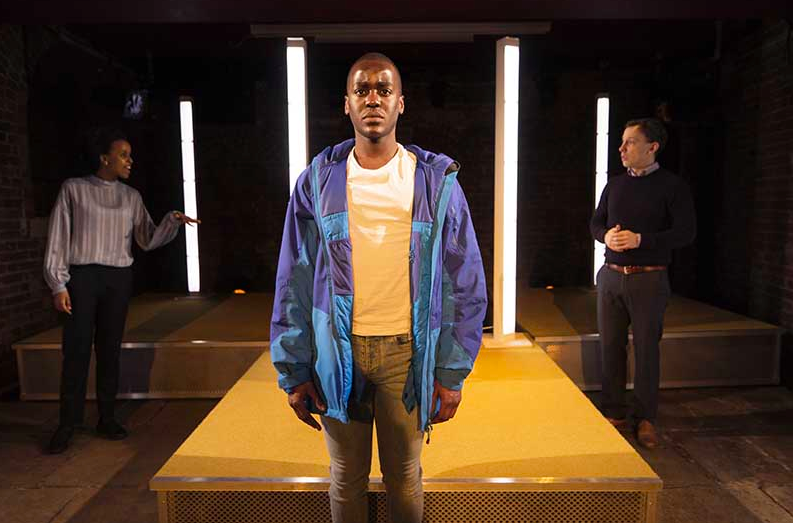
The Claim, Summerhall – Roundabout
 (3 / 5)
(3 / 5)
As part of the British Council Showcase 2019, Tim Cowbury has written a piece that is deliberately fraught with frustration for the audience as the claimant’s story is ignored, manipulated and suppressed by the other characters.
Serge (affable Ery Nzaramba) is here because… Why? He wants to tell his story because he doesn’t want to be deported – but will the interpreter and case worker listen? Will they heck. They are more concerned with chatting about their upcoming holiday than letting Serge tell his story – and when they do start listening, their own prejudices get in the way of the truth.
When Serge manages to get a word in, it is misinterpreted by the interpreter, and then the answer is warped even further by the case worker.
Ask him where he lives, asks the case worker.
‘where do you live?’ says the interpreter.
‘Streatham.’
‘No, before?’
‘Were there elephants there?’
‘In Streatham?’
According to the UK government, there were 29,380 asylum applications in 2018. Sixty-seven per cent of which were refused asylum.
Asylum decisions in the UK take place behind closed doors, and over the last couple of decades, asserts the show, they have become increasingly kafkaesque. Through the journey of one claim, Cowbury shines a light on the bureaucratic, misleading, pressurised and unfair ways that claimants are asked to give testimony.
As Serge’s story is twisted beyond all recognition he is painted into a perpetrator and criminal when he is in fact a victim. Directed by Mark Maughan, it’s incredibly difficult and frustrating to watch as he is ignored, cajoled and accused, as he tries repeatedly to get the truth across.
This work has wider ramifications about what the UK is and how it wants to be seen in the modern world and this performance paints a picture of a land full of petty prejudices and xenophobia.
Not an easy viewing experience, but a necessary one.
Your sexts are shit, Summerhall
 (4 / 5)
(4 / 5)
It’s 11.30 in the morning and we are listening to performer Rachel Mars reading a letter sent from James Joyce to his lover Nora Barnacle in 1909:
“You had an arse full of farts that night, darling, and I fucked them out of you, big fat fellows, long windy ones, quick little merry cracks and a lot of tiny little naughty farties, ending in a long gush from your hole.”
It’s surprisingly explicit and instantly banishes any preconceptions that talking dirty is a modern preoccupation. James Joyce, or ‘Jim’ as he signed off those letters, was very dirty indeed. He loved to do it ‘arseways’ and wrote eloquently and at length on the subject.
Mars feels we have lost the fine art of writing about our sexual desires, as demonstrated by the series of modern lacklustre sexts displayed on the screen behind her.
Texts like ‘I wanna get underneath the table and make it hard for you to talk’ are contrasted with letters like this from Frida Kahlo to her husband Diego Rivera:
“Everything was surrounded by the green miracle of the landscape of your body. Upon your form, the lashes of the flowers responded to my touch, the murmur of streams. There was all manner of fruits in the juice of your lips, the blood of the pomegranate, the horizon of the mammee and the purified pineapple.”
Letters from Eleanor Roosevelt to her lesbian lover, Charles Bukowski to his girlfriend Linda King, Proust to his grandfather begging for money to purchase a prostitute – these letters are lush and bitter and carnal and profane.
We are living in an age of instant, thoughtless charmless communication. We’ve swapped illicit love notes for dick pics. But have our emotions dulled as much as the missives we thoughtlessly shoot to our partners on tiny screens?
Mars’s presentation is simple and not particularly theatrical; letters are read out, sexts are displayed, repeat. But a more subtle message is being conveyed. As Mars shares mundane poetry from her ex-lovers as well as her own, far better descriptions of her sexuality and the sexual identity she wants to present, the show presents an image of how modern love has changed from that of just a century ago; the picture of sexuality in the modern age is one of instant gratification, but also of quiet, comfortable cohabitation. We don’t need to write letters to cross the oceans separating us when we have Skype. And maybe that text saying don’t forget to buy milk is just another coded, pleading message, asking someone to remember your needs.
Who Cares, Summerhall
 (4 / 5)
(4 / 5)
Nicole (Lizzie Mounter) started caring for her mum when she was only four. Jade (Jessica Temple) has always cared for her brother, who has learning difficulties and uses sign language but one day she becomes the carer for her dad too after he is consigned to a wheelchair. Connor (Luke Grant) cares for his mum, she struggles to get out of bed sometimes after her family died all within a few months of each other and then Connor’s dad left him to help her on his own.
Theatre makers LUNG are Associate Artists at The Lowry, making work for communities in and around Manchester. Director and writer Matt Woodhead took two years of interviews with young carers living in Salford to form this profound work highlighting the hidden young carers aged 18 and under who are propping up the NHS by working for free to care for a parent or sibling.
One in 12 young people care for someone. They save the country £132 billion a year in the unpaid caring they do. As this work highlights, they get little or no support and no relief from this work.
The authenticity of the real-life interviews is preserved by the three actors who bear out the optimism and resilience of their real-life counterparts.
As the stories of the three carers interweave and unfold, the characters remind us that this could happen to any of us – all it takes is a parent to turn left instead of right crossing the street.
The effect of benefits cuts is particularly hard to listen to and verbatim interviews with child support services show how their funding has been stripped down to virtually nothing at all. the most shocking aspect of the show is that many of these kids are hidden – they are not known by the authorities and so no help can be put in place to assist them.
While the stories are grim – and the prospects for these young people’s futures are poorer than their non-carer counterparts (they will attain poorer grades at GCSE and their households will earn less) their is great hope and courage that bouys them up – moments of happiness and joy are snatched and cherished, whether it be a parent learning to speak again after a stroke, or a great song they love played out a full volume on their headphones, these children have been forced to have almost more responsibility than they can bear, but they’ve also leant to grasp at joy, and remain unbeaten by their circumstances.
